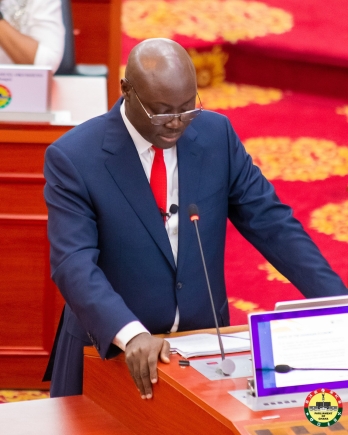
Government saves US$250m after restructuring power agreements, ECG revenue increases to US$1.7bn monthly - Ato Forson
The government has successfully renegotiated all power purchase agreements with independent power producers, saving over US$250 million and restructuring GH¢1.1 billion in energy sector debt over a four-year period.
Finance Minister Dr Cassiel Ato Forson announced this during the presentation of the 2026 Budget Statement to Parliament on Thursday, November 13, 2025.
He said the Electricity Company of Ghana’s (ECG) monthly revenue had increased by about 90 per cent, from US$900 million to US$1.7 billion.
Dr Forson told Parliament that when the administration assumed office, Ghana’s energy sector owed US$1.4 billion to independent power producers. He said the burden had been reduced through extensive negotiations led by local experts.
“We have renegotiated all power purchase agreements led by Ghanaian experts at no cost to the state,” Dr Forson said.
He added that the government was now “fully current on payment, having cleared US$300 million in 2025 year-to-date and allocating US$345 million for 2026.”
Dr Forson described the development as a milestone, saying, “For the first time, we are not approving new arrears in the energy sector.”
The renegotiations have resulted in lower tariffs for consumers. Solar projects such as BXC and Meinergy have seen their rates reduced from 18 cents to 6.5 cents per kilowatt hour, cutting costs while expanding access to power.
The minister attributed ECG’s revenue improvement to “better enforcement of the cash waterfall mechanism,” a payment system that promotes transparent fund distribution within the energy sector.
Presenting the budget under the theme “Resetting for Growth, Jobs and Economic Transformation,” Dr Forson said the economy was recovering from what he called a “daunting inheritance” from the previous administration.
He reported that Ghana’s economy grew by 6.3 per cent in the first half of 2025, up from 5.1 per cent in the same period in 2024, driven by stronger performance in agriculture and services.
Dr Forson said inflation had dropped from 23.8 per cent in December 2024 to 8 per cent by October 2025, returning Ghana to single-digit inflation.
“This was not by sheer luck,” he said. “It is the outcome of disciplined fiscal policy, steady monetary management, stable exchange rates and strong domestic production.”
Food inflation declined from 27.8 per cent to 9.5 per cent. Dr Forson said prices of common food items such as tomatoes, garden eggs, okra and fish had fallen.
He added that the government had recorded a primary balance surplus of 1.6 per cent by September 2025, reversing a 3 per cent deficit in 2024. Non-oil tax revenue also rose to 8.7 per cent of GDP from 7.8 per cent the previous year.
According to Dr Forson, Treasury bill rates have dropped, saving GH¢8.8 billion in interest payments between January and September 2025. He said Ghana’s public debt had fallen to its lowest level in a decade.
“Ghana’s debt risk has been reclassified from high to moderate,” he said, adding that confidence was returning to the economy.
He noted that the services sector grew by 8.8 per cent, led by ICT at 17.2 per cent and education at 14.9 per cent. Agriculture also expanded by 6 per cent, with cocoa output recovering from a 21.4 per cent contraction to 2.8 per cent growth.
Looking ahead, Dr Forson said the government’s priorities for 2026 would be to maintain macroeconomic stability, speed up economic transformation and job creation, and strengthen security and social protection systems for inclusive growth.
He pledged to maintain fiscal discipline, stating, “Never again must we allow recklessness, waste and indiscipline to define how we handle the people’s money.”
Dr Forson said several bills would be submitted to Parliament, including the Value for Money Bill, Virtual Asset Service Providers Bill, and Value Added Tax Bill.
He also mentioned a proposal for approval to deploy an AI-powered trade data analytics system to improve customs revenue collection.
The minister said the government had increased allocations to social protection programmes from 0.6 per cent of GDP in 2024 to 0.9 per cent in 2025, reflecting what he described as “our conviction that economic stability must translate into social progress.”
